John Hindrocket of Powerline is a stanch defender of the Administration’s use of warrantless NSA wiretaps. In this post, he writes an update:
OK, JUST ONE MORE THING: We’ve been getting emails from liberals who seem to think that the 72-hour provision of FISA makes the problem of speed disappear. I did a separate post on that issue above, titled "72 Hours: Who Could Ask For More?" I will say, briefly, that anyone who thinks that not only preparing an extensive application ab initio, but actually getting an order signed by a federal judge within 72 hours, is easy, is a person who has never practiced law in the federal courts.
[Emphasis mine].
It’s Hindrocket’s "separate post" and this issue that I wish to address.
Hindrocket lays out the statute (and so will I in a moment), and comes to the conclusion that it would may take "days, sometimes weeks" to assemble a FISA application.
He further adds the following:
Anyone who thinks that it is easy for multiple lawyers and officials to collaborate on a set of documents, present them to a federal judge and have the judge sign the order within 72 hours has, I’m afraid, no experience whatever at obtaining orders from federal judges.
That may be (and probably is) true in John’s experience, but not in the real legal world. Want a real world example? In the 2000 Florida election debacle, teams of lawyers (for both sides) would research and generate 50+ page emergency briefs in a couple of days. And those involved actual legal research, something not required by the FISA warrant application statute. It can be done, and often is.
Let’s turn to the statute that Hindrocket claims is so onerous. Now, it’s clear that the statute is lengthy and verbose and dry. But don’t worry. When you get rid of the excess verbiage, you will see that it is manageable. In fact, it requires less information than a typical college entrance application. Here it is:
(a) Submission by Federal officer; approval of Attorney General; contents
Each application for an order approving electronic surveillance under this subchapter shall be made by a Federal officer in writing upon oath or affirmation to a judge having jurisdiction under section 1803 of this title. Each application shall require the approval of the Attorney General based upon his finding that it satisfies the criteria and requirements of such application as set forth in this subchapter. It shall include—
(1) the identity of the Federal officer making the application;
(2) the authority conferred on the Attorney General by the President of the United States and the approval of the Attorney General to make the application;
(3) the identity, if known, or a description of the target of the electronic surveillance;
(4) a statement of the facts and circumstances relied upon by the applicant to justify his belief that—
(A) the target of the electronic surveillance is a foreign power or an agent of a foreign power; and
(B) each of the facilities or places at which the electronic surveillance is directed is being used, or is about to be used, by a foreign power or an agent of a foreign power;
(5) a statement of the proposed minimization procedures;
(6) a detailed description of the nature of the information sought and the type of communications or activities to be subjected to the surveillance;
(7) a certification or certifications by the Assistant to the President for National Security Affairs or an executive branch official or officials designated by the President from among those executive officers employed in the area of national security or defense and appointed by the President with the advice and consent of the Senate—
(A) that the certifying official deems the information sought to be foreign intelligence information;
(B) that a significant purpose of the surveillance is to obtain foreign intelligence information;
(C) that such information cannot reasonably be obtained by normal investigative techniques;
(D) that designates the type of foreign intelligence information being sought according to the categories described in section 1801 (e) of this title; and
(E) including a statement of the basis for the certification that—
(i) the information sought is the type of foreign intelligence information designated; and
(ii) such information cannot reasonably be obtained by normal investigative techniques;
(8) a statement of the means by which the surveillance will be effected and a statement whether physical entry is required to effect the surveillance;
(9) a statement of the facts concerning all previous applications that have been made to any judge under this subchapter involving any of the persons, facilities, or places specified in the application, and the action taken on each previous application;
(10) a statement of the period of time for which the electronic surveillance is required to be maintained, and if the nature of the intelligence gathering is such that the approval of the use of electronic surveillance under this subchapter should not automatically terminate when the described type of information has first been obtained, a description of facts supporting the belief that additional information of the same type will be obtained thereafter; and
(11) whenever more than one electronic, mechanical or other surveillance device is to be used with respect to a particular proposed electronic surveillance, the coverage of the devices involved and what minimization procedures apply to information acquired by each device.
Let’s break it down now.
(1) the identity of the Federal officer making the application
That’s the name and title of the federal officer. Takes 30 seconds at best to supply that information.
(2) the authority conferred on the Attorney General by the President of the United States and the approval of the Attorney General to make the application
This is a cite to the relevant FISA statute(s). This will be the same ones over and over again for any warrant. It’s cut-and-paste. Add another 30 seconds.
(3) the identity, if known, or a description of the target of the electronic surveillance
Another identity question. Add another 30 seconds, less it the target’s identity is "unknown".
(4) a statement of the facts and circumstances relied upon by the applicant to justify his belief that—
(A) the target of the electronic surveillance is a foreign power or an agent of a foreign power; and
(B) each of the facilities or places at which the electronic surveillance is directed is being used, or is about to be used, by a foreign power or an agent of a foreign power
This is where it starts to get a little situation dependent. Presumably, however, there exists information which leads the NSA to believe the target is worth surveilling. The applicant here simply has to open the file (or talk to someone knowledgeable about the target), and gather the facts and circumstance. This could take a few minutes, but to be overly generous, let’s say it takes two hours to marshall the facts and pull them together in a coherent form.
Guess what? We’re one-third of the way through the application, and it’s not even lunchtime on Day One!
(5) a statement of the proposed minimization procedures
Here’s where you tell the FISA court what you are actually going to do (wiretap, etc.). Since the procedure you are doing is one that you have done before, this is largely a matter of "cutting and pasting" from previous application, and editting if necessary as needed. Total time: one hour.
(6) a detailed description of the nature of the information sought and the type of communications or activities to be subjected to the surveillance
Again, you probably don’t have to reinvent the wheel with this one. You simply have to inform the court of the nature and type of information you hope to acquire. Like "oral conversations pertaining to the possible transfer of weapons through one of several ports of the United States". Only with some details, to the extent you know them. We’ll gratuitously give ourselves three hours to compile and write this information.
We’re over halfway done with the FISA application.
(7) a certification or certifications by the Assistant to the President for National Security Affairs or an executive branch official or officials designated by the President from among those executive officers employed in the area of national security or defense and appointed by the President with the advice and consent of the Senate—
(A) that the certifying official deems the information sought to be foreign intelligence information;
(B) that a significant purpose of the surveillance is to obtain foreign intelligence information;
(C) that such information cannot reasonably be obtained by normal investigative techniques;
(D) that designates the type of foreign intelligence information being sought according to the categories described in section 1801 (e) of this title; and
(E) including a statement of the basis for the certification that—
(i) the information sought is the type of foreign intelligence information designated; and
(ii) such information cannot reasonably be obtained by normal investigative techniques
Wow. That looks like a lot, but it really isn’t. This is a certification. Therefore, it is plain boilerplate language. All you have to do is get the proper someone to sign the certification, the language of which is laid out in the statute itself ("I, Joe Smith, hereby certify that the information sought is foreign intelligence information", etc.). You may have to put a staff assistant on this one, while you do other stuff, but it shouldn’t take him more than three hours.
(8) a statement of the means by which the surveillance will be effected and a statement whether physical entry is required to effect the surveillance;
"The wiretap will be effected by placing an electronic recording device at the telephone switching station which processees the calls for the subject target’s phone. The telephone switching station located at 10 Main Street, Baltimore, MD and is owned and operated by Alltel, Inc., who is cooperating in this surveillance. No physical entry of the target’s premises is required."
Okay, I made that language up. But it only took me two minutes. And I didn’t have any go-bys.
(9) a statement of the facts concerning all previous applications that have been made to any judge under this subchapter involving any of the persons, facilities, or places specified in the application, and the action taken on each previous application
Well, since the statute requires this information, I’m going to go on the assumption that FISA applications are kept on a searchable database, and this information can be coughed up. If it can’t, then all you have to do is look at the latest FISA application, take the information compiled for Section (9) from that verbatim, and then update it. Let’s be really gratuitous and say that it takes a staff assistant ten hours to do this, although really, it could take as little as ten minutes.
(10) a statement of the period of time for which the electronic surveillance is required to be maintained, and if the nature of the intelligence gathering is such that the approval of the use of electronic surveillance under this subchapter should not automatically terminate when the described type of information has first been obtained, a description of facts supporting the belief that additional information of the same type will be obtained thereafter; and
Because there is a contingency here, this is another variable factor. Can anyone imagine that answering this part would take more than three hours? Me neither.
(11) whenever more than one electronic, mechanical or other surveillance device is to be used with respect to a particular proposed electronic surveillance, the coverage of the devices involved and what minimization procedures apply to information acquired by each device.
Okay. Will if there is only one surveillance device, then this part takes no time to answer. But let’s say the particular surveillance being applied for involves three devices. No. Let’s make it five. It shouldn’t take more than five hours to answer this, right?
And there you have it. We’re looking at roughly 24 hours to prepare the FISA application, assuming the worst case scenario.
And remember, this is AFTER the wiretapping has begun.
Now, Hindrocket’s post merges the distinction between preparing the application and having it approved. He says, for example, that it may take weeks to "prepare and approve" the application. And that may be so, when it comes to non-emergency applications. But the notion that preparing the "emergency" application ties the hands of the Bush Administration is absolutely silly. If there truly was exigent circumstances — an actual emergency — the approval process (I hope) would certainly be fast-tracked way ahead of routine warrant applications.
That’s just a small contribution to the dialogue. I would love to take apart John’s argument (in the same post) that it is inconvenient for our intelligence agencies to worry about things like "probable cause", but that’s a separate matter altogether.

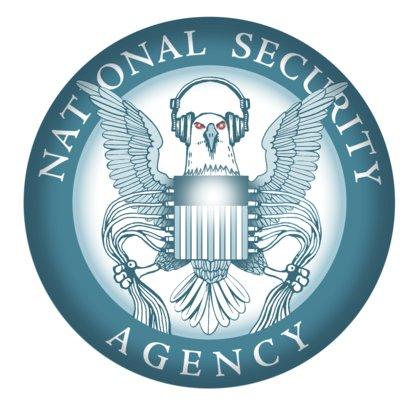
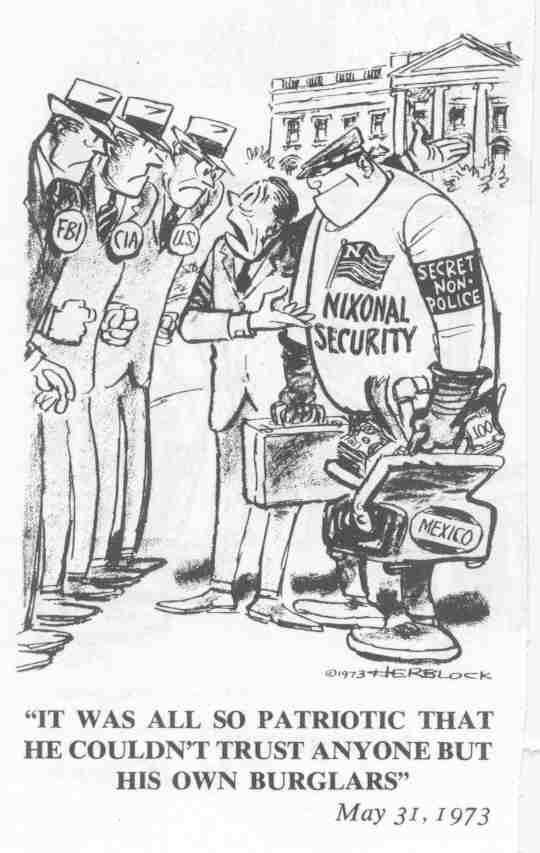

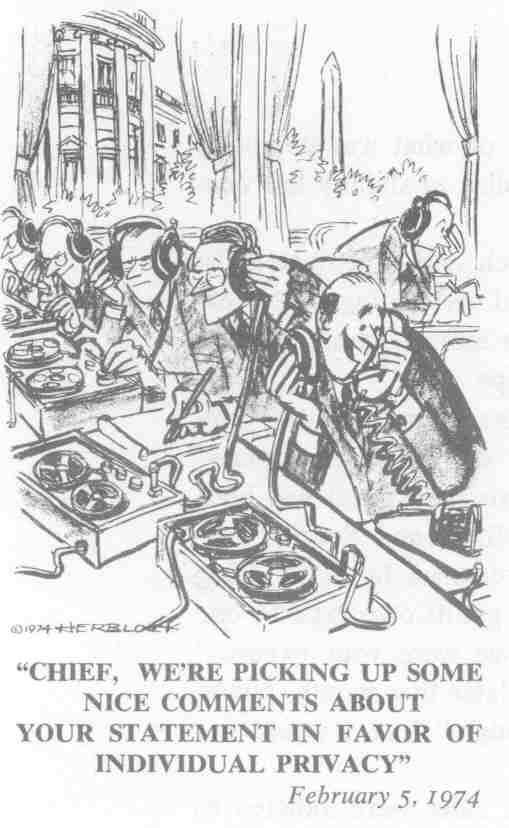
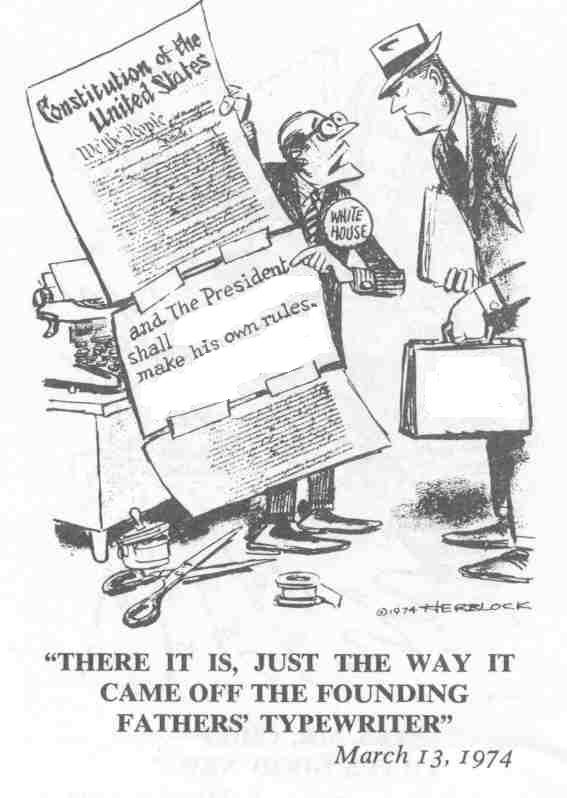
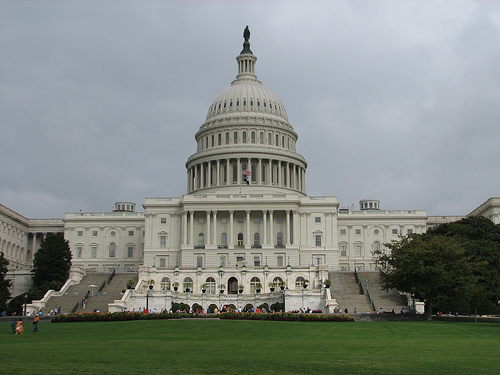
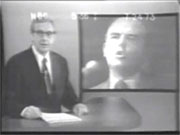
 Flashback to 1973.
Flashback to 1973.